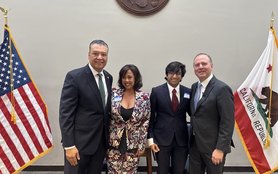Grassroots organizing and coalition building led to a major victory for workers' rights in New Orleans last November with the passage of the Workers’ Bill of Rights. By mobilizing communities, amplifying impacted voices, and navigating preemption laws, advocates led a campaign that enshrined a commitment to workers’ rights like a living wage and access to paid sick leave in the City’s Home Rule Charter. Step Up Louisiana organizer Tasha Williams shares her experience of how this success showcases the power of collective action to drive meaningful change, even in challenging political landscapes.
I was taught from an early age that each and every one of us has a voice and we have to fight for our rights. But it wasn’t until I found myself incarcerated that I put my family’s lessons into action. Today I’m working with Step Up Louisiana to ensure we all understand our collective power. And in New Orleans, we just proved what’s possible when we come together.
In November, we passed the Workers' Bill of Rights, a monumental win for working class communities. This victory shows how grassroots organizing, strategic ballot initiatives, and creative workarounds to preemption laws can bring real change.
The Power of Collective Action
When I was incarcerated at the Louisiana Correctional Institute for Women, I saw how power worked—and how often it was used to strip people of their dignity. We didn’t have basic things like menstrual products and toiletries. When we asked for the essentials, we were at best ignored, and at worst punished. My uncle Robert Goodman, a legendary community organizer, told me to get a petition started.
I passed that petition around the yard. Though I knew I was doing the right thing, I still had nervous butterflies in my stomach. Some of the women were scared and refused to sign. Some even reported me to the guards. I was thrown into solitary confinement for "inciting a riot." But I didn't stop—I remembered the legacy set by my Uncle Robert, and I knew that we had to stand up for ourselves. I knew that sometimes change begins with one person finding the courage to speak up.
Eventually, the petition reached a lawyer, who got it to the Department of Corrections. Our voices forced them to shut down operations for two days to meet our needs. That moment showed me the power we have when we stand together.
That same belief in collective power drove our fight for the Workers' Bill of Rights, which passed with a landslide 80% of the vote. Now, New Orleans has affirmed its commitment to workers’ rights in the Home Rule Charter—essentially, the city’s constitution—from a living wage to paid sick leave. And we won’t stop there. This fight is part of a larger movement to ensure all workers can live and work with dignity, even in a right-to-work state like Louisiana with regressive labor laws that make it harder to unionize and keep the rock-bottom federal minimum wage in place across the state.
Strategic Ways to Organize and Pass Ballot Initiatives
For communities facing hostile labor laws, ballot initiatives offer a way to bypass politicians who ignore our needs. Here’s how we made it happen — and how others can do the same:
- Grassroots Mobilization: Step Up Louisiana trained dozens of local organizers through our Fall for Liberation campaign. We knocked on doors, talked to neighbors, and built a movement. People listened when we told them they didn’t have to accept poverty wages and unsafe working conditions.
- Center Impacted Voices: My own experience made me a stronger advocate. People connect with real stories. The most powerful voices in this fight are those of workers who know firsthand what it means to struggle.
- Coalition Building: We didn’t do this alone. Labor unions, faith leaders, small business owners, and community organizations stood with us. Together, we were too loud to ignore.
- Narrative Control: Telling our own stories helped us reclaim the conversation. We showed what the Workers’ Bill of Rights would mean for everyday people and helped shape public opinion on economic justice in our communities.
- City Partnerships: Through a strong relationship with the New Orleans Health Department and City Council, we made sure our initiative was backed by key local public figures.
Working Around Preemption Laws
Louisiana has preemption laws designed to stop local governments from passing pro-worker policies, like municipal minimum wage laws. In the face of Governor Jeff Landry’s push to erode worker power, the vote to pass the Workers’ Bill of Rights sends a resounding message that New Orleanians want their leaders to act to protect workers.
When progress is blocked at the state level, we can push for city-wide ballot measures that demand accountability of our leaders and put workers at the center. We’re moving forward to implement a Workers’ Commission and Healthy Workplace Incentive Program to uphold the tenets of the Workers’ Bill of Rights, and we will continue to collaborate with City Hall to drive those efforts forward.
Conclusion
The victory of the Workers' Bill of Rights in New Orleans is proof that we have power—even in states that try to silence us. But we know the fight doesn’t end with one win. Organizing isn’t just about passing policies; it’s about making sure those in power follow through. And it’s about growing our movement so that no worker has to fight alone.
As someone who knows what it’s like to feel powerless, I’m here to say that change is possible. The same strength I saw in the women who signed that prison petition lives in every worker who demands fair wages and dignity. If you’re ready to take action, join your local movements, support worker-led campaigns, and stand with us. Together, we can transform even the most hostile landscapes into places where all workers thrive.



